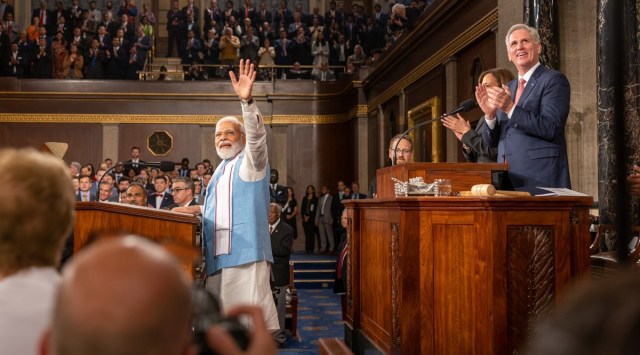
Modi-Biden partnership and the Uniform Civil Code question
This week, there were two events of note with respect to India. The first was PM Narendra Modi’s visit to the US from June 20 to June 24 and the second was the Law Commission’s solicitation of views from the public as well as prominent religious organisations on the issue of a Uniform Civil Code.
The common points of discussion were, first, the reason for America wooing India and second, the joint statement issued by PM Modi and President Joe Biden that included a call to Pakistan to control militancy.
News International (June 24) said, “the West looks at India as an economic and geo-strategic partner, especially when it comes to creating some sort of bulwark against China.” On the militancy issue in the US-India joint statement, the editorial said, “Pakistan should raise the issue of the joint statement at the highest forums because the language used against Pakistan may not be new but it is insulting… Pakistan has presented evidence of Indian involvement in terrorist activities but the world has turned a blind eye to that as well as the blatant human rights violations in Indian-Occupied Kashmir and India itself.”
Dawn (June 24) agrees saying, “While Pakistan has had a problem with militancy, the critique would have carried more weight had the Biden administration also brought up India’s deplorable treatment of its Muslims, and its long subjugation of Kashmir.” Express Tribune (June 24) believes that the joint statement showed “Washington was harping to the tune from India”. Most importantly, speaking from the international relations perspective, “India’s inking of big-ticket projects… has cemented a decade of neo-World Order in Asia.”
On the Law Commission’s solicitation of comments on a Uniform Civil Code, Express Tribune (June 23) says, “there is some legitimate criticism of the separate systems because, within the minority groups, the laws still take on a majoritarian appearance”. The Tribune encouraged participation of minority groups in formulating this legislation saying, “the government is taking a softer approach on this issue… it may be worth it for religious groups to actually participate and try to influence rule changes — or limit change — instead of complaining from the outside.”
Blinken in China
On the international front, the main topic of discussion has been US Secretary of State Antony Blinken’s visit to China earlier this week. The overall narrative around this meeting is hopeful as it seeks to put two superpowers on the same page.
The Nation (June 20) focuses on trade as an important part of collaboration among the US and China saying, “By engaging in constructive dialogue, both nations have the opportunity to find common ground… and establish a more balanced and mutually beneficial trade relationship.” Other than that, “addressing security concerns, and collaborating on global challenges are imperative for both nations”. Express Tribune (June 22) emphasises the importance of bilateral relations between US and China for the rest of the world saying, “A lot of thinking is required at all fora of interaction as this bilateralism has a profound impact on world’s peace and security.” According to Tribune, “The world economy cannot be saved from a renewed recession until and unless a common denominator is found by Beijing and Washington.”
Dawn (June 22) examines the points of contention and Taiwan’s territorial issue as the “lightning rod” saying, “Both sides have been exchanging increasingly combative rhetoric over Taiwan, and recent visits by senior US officials to Taipei saw the mainland fuming.” Even so, the underlying concern for Pakistan is the stability of relations between US and China since “Policymakers in Islamabad should be particularly concerned about the US-China rivalry degenerating into an open conflict, as China remains an economic and strategic partner, while US-Pakistan ties, though not ideal, are also important.”
A colossal Greek boat tragedy
The most shocking news this week was the sinking of a fishing boat off the coast of Pylos in Greece on June 14, carrying an estimated 750 people onboard. Of the 750, around 350 people were Pakistani. About 100 have died and 80 have been rescued so far — 500 others remain missing.
The media collectively demands accountability from foreign authorities for their negligence and from their own government for creating such terrible conditions that forced so many to resort to migration in dangerous ways. They are calling for “immediate action against those who facilitate illegal human trafficking” (The Nation, June 20).
Dawn (June 19) states, “the absence of help by the coastal authorities is part and parcel of Europe’s larger xenophobic policy that aims to keep migrants out.” But “Fortress Europe alone cannot be blamed for why people in developing countries, such as Pakistan, choose to leave.” Daily Times (June 21) says, “[it] is a stark reminder to the state that it has altogether failed to provide its people what they need to lay their roots at home.”
News International (June 20) and The Nation (June 20) focused on the discrimination faced by Pakistanis. The Nation notes, “Certain nationalities, particularly Pakistanis, were forced into the most dangerous part of the ship where they experienced suffocation caused by overcrowding and were left thirsty as drinking water had reportedly finished.” News International added that “Survivors have also alleged that the inaction of the Greek authorities helped cause the incident and that they refused to help despite the presence of several ships at the location.” The editorial concludes by saying that “There is no excuse — legal, moral or other — to allow vulnerable and exploited people to just drown at sea.”
adya.goyal@expressindia.com